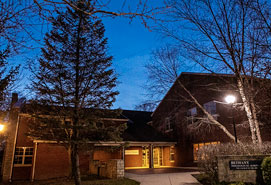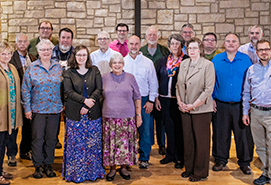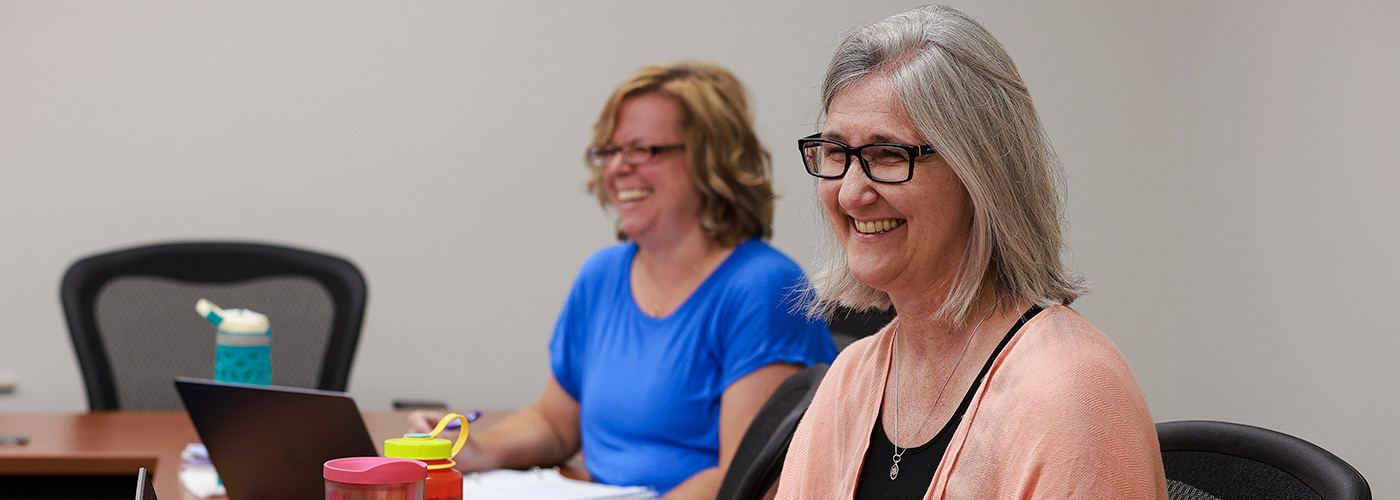A BETHANY EDUCATION
Bethany Theological Seminary guides students to devote their spiritual and intellectual gifts to disciplined study, worship of God, and practice as they prepare for leadership in the church and world. In Bethany courses, students do not simply experience teaching and learning about scripture, history, theology, and worship. They are guided by teaching and learning for joyful investigation of questions about faith and public life; critical and compassionate thinking; collaborative study and scholarship; bridge-building dialog; intercultural competence; integration of mind, body, heart, and spirit, innovative reconciliation ministries; and imaginative skills and strategies for peacemaking.
Such education opens students to God’s transforming work and extends through them toward the healing and flourishing of our world, preparing them to be
- visionaries who imagine and proclaim God’s reality;
- servant leaders and administrators who encourage and guide faithfully;
- pastors and teachers who nurture and inspire;
- prophets who inform the center from the margins;
- ethicists who speak truth to power;
- evangelists who spread the gospel;
- environmentalists who care for all creation as holy gift;
- poets and preachers who are artists of interpretation;
- peacemakers who build bridges toward justice.
THE BETHANY STORY
Bethany Theological Seminary is one of eight institutions of higher education related to the Church of the Brethren. It was founded in October 1905 by Albert C. Wieand in association with Emanuel B. Hoff. Known initially as Bethany Bible School, the venture began with twelve residents who met in the Hoff home on Hastings Street on the near-south side of Chicago.
In 1909, the first building was erected on the school’s second campus at 3435 West Van Buren Street. Rapidly expanding enrollment necessitated further construction, which was achieved through much prayer and sacrifice. The first bachelor of divinity degree was granted in 1913.
Recognition by the Church of the Brethren Annual Conference came in 1909, followed by an action in 1925 to establish a more direct affiliation with the Conference. The name of the school was officially changed in 1931 to Bethany Biblical Seminary. As declared in the articles of incorporation, the objective of the Seminary was “to promote the spread and deepen the influence of Christianity by the thorough training of men and women for the various forms of Christian service, in harmony with the principles and practices of the Church of the Brethren.”
In 1940, the Seminary was fully accredited by the American Association of Theological Schools (now called the Association of Theological Schools in the United States and Canada) and through the years has maintained this accreditation. Accreditation by the Higher Learning Commission was granted in 1971 and continues. In fall 2016, Bethany received the maximum period of reaffirmation of accreditation by both agencies (ten years), extending to 2026.
In 1957, the board of trustees approved the relocation of the Seminary to a site near Oak Brook, Illinois. In June 1963, the official name of the school was changed to Bethany Theological Seminary. The Seminary commenced its life on its new and third campus in the fall of that year.
In 1992, the Bethany board approved the relocation of the Seminary to Richmond, Indiana, in association with the Earlham School of Religion (ESR) and in partnership with the congregations of the Church of the Brethren. That relocation was completed in time for the opening of school in the fall of 1994. In October 1993, Bethany began offering its first off-site courses hosted by the Susquehanna Valley Satellite (now Susquehanna Valley Ministry Center) located on the campus of Elizabethtown College in Pennsylvania.
In 2003, Bethany began offering courses online. Bethany now has a robust offering of courses online and using synchronous video for real-time classroom discussion. The latter is made possible through two technology classrooms, constructed in 2014-2017. Both rooms were updated and a third technology classroom was added in 2022. Beginning in 2016, out of a commitment to intercultural engagement, Bethany entered into a partnership with Ekklesiyar Yan’uwa a Nigeria (Church of the Brethren in Nigeria, EYN) to provide theological education for our sister denomination, including a technology center in Jos, Nigeria.
As our distance education has expanded, Bethany remains committed to a strong and vibrant residential student educational experience. In recent years, the Bethany Neighborhood was created and a new program allowing students to graduate without any additional educational or consumer debt was implemented (Pillars and Pathways Residency Scholarship). Building on the success of PPRS, a new residential program with a community engagement component, known as Bethany BOLD, commenced in fall 2023.
Our history shows Bethany is nimble and adaptive to changing circumstances. This value continues today, as we strive to provide excellent theological education in diverse formats, settings, and attentive to the realities of our wider world and context.








 Green Circle: Bethany invests in 100% renewable energy.
Green Circle: Bethany invests in 100% renewable energy.